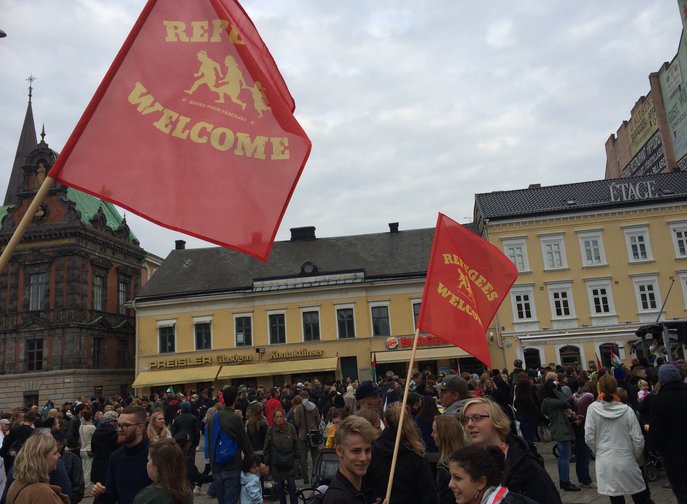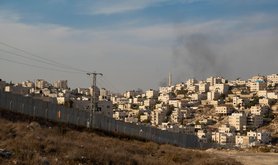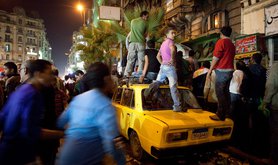
Syrian refugees in Scandinavia fear they will be forcibly returned to Syria
Denmark has decided that parts of Syria are now safe and revoked residency permits for Syrian refugees. Will other countries follow suit?

The Danish government has decided that Syrian refugees from Damascus and the surrounding areas can now return safely to their homeland. Although the Danish Embassy in Damascus remains closed due to the security situation in Syria, the Danish government has deemed the country safe enough for Syrians to return.
On the basis of this assumption, which relies on a faulty government report that misrepresents the current situation, the Danish government has revoked, or threatened to revoke, the residence permits of hundreds of Syrians.
As long as Syria is still under the rule of Bashar al-Assad and the Syrian Ba’ath Party, it is not safe for any returning refugee. The prospect of other countries following suit sends a wave of fear and uncertainty throughout the Syrian diaspora, especially in Scandinavia.
Abed is a Syrian refugee who has been living in Sweden for five years. “The unreasonable decision made by the Danes may push forward a new Swedish government that will abandon its obligations towards Syrians here, including me,” he says with a worried voice. “I really feel helpless and hopeless,” he adds.
The lesson Syrians throughout Scandinavia are learning from Denmark is that no Syrian is safe from forced return.
Far-Right parties erected posters in Copenhagen telling Syrians that they can now return to ‘safe and sunny Syria’
Two years ago, in February 2019, the Danish Immigration Service published their country of origin report on Syria. The report concluded that the security situation in Damascus and the surrounding areas is now safe. The Danish media disseminated the news, and politicians argued in favour of reconsidering cases of Syrians who had been given Danish residence permits.
Back then, the Syrian Cultural Institute in Denmark called a town hall meeting in which around 30 Syrians shared their worries about the uncertainty of their lives in Denmark, especially their new-found feelings of vulnerability due to the government’s revised measures and the intense public debate on the subject. Many expressed their fear of being deported to Syria and imprisoned by the Assad regime. Some spoke about losing their properties in Syria to looters. Young men were afraid of being conscripted. Many others discussed the steps they had taken to establish a new life in Denmark, with a local girl/boyfriend, sending their children to school or being connected to the Danish labour market.
What they lost in Syria because of the war they were happy to have found again in Denmark.
Based on the meeting, the Institute published an article in Politiken, one of the biggest newspapers in Denmark.
Today, Denmark is witnessing virtually the same discussion, but on a much larger scale. In addition to the 189 Syrians who have had their Danish residency revoked since last summer, an additional 500 are at risk of the same result, and another 95 applications for residency were rejected.
Neither Denmark nor the EU have dealings with the Assad regime. This means that Syrians without valid residency awaiting deportation would have to live in holding centres in Denmark for an indefinite time, adding to the trauma they have already experienced. Despite this, some far-Right parties in Denmark celebrated the move, and erected posters in Copenhagen telling Syrians that they can now return to “safe and sunny Syria”.
A flawed report
Denmark’s policy is based on a report that is fundamentally flawed. The report bases its evaluation on a handful of interviews (just 12 in total), including one with Naji Numeir, a Syrian general in the Assad regime who also happens to be the head of the regime’s immigration service.
The report misrepresents hand-picked quotes from experts in Jordan and Lebanon, including Sara Kayyali and Bente Scheller, who protested heavily against its conclusions. Eleven out of the twelve interviewees did the same. The quotes are taken out of context and seem to serve mostly as welcome propaganda for Assad.
In addition, the Danish government concluded that Damascus and its surroundings are safe simply because the Syrian government reasserted full control over the area. But this is exactly the problem in the eyes of Syrians in Scandinavia: the tight grip of the Syrian dictatorship and its security forces poses the greatest danger for returning refugees. Forensic evidence shows that Assad’s repressive system is systematic, structural and brutal, and there is also evidence of unprecedented crimes against humanity.
Norway: no returns yet
The safety or otherwise of Damascus and its surroundings has been the subject of ongoing debate throughout Scandinavia. In 2018, Jan Egeland, the secretary general of the Norwegian Refugee Council, predicted on NRK, Norway’s national public broadcaster, that areas of Syria may experience a periodic cessation of violence, only to erupt again.
The warning was clear then: a cessation of violence does not guarantee safety for returnees without a durable agreement by the warring parties, which has yet to happen.
Norway, home to more than 31,000 Syrians, has maintained its position that the situation in Syria is unsafe for refugee returns and it does not assist in voluntary returns. On the contrary the Norwegian government confirmed that some people would be especially targeted by the Assad regime if they returned to Syria, including former opposition activists, members of the media, those involved with the White Helmets, and those who have not entered into so-called “reconciliation agreements”.
“How will it feel to learn that the Syrian you returned got arrested, tortured and murdered after their flight landed in Damascus?”
On 24 April, Hilde Barstad, state secretary in Norway’s Ministry of Justice said “We do not have plans now” to return Syrians. At least, not yet.
However, in light of the Danish government’s policy and actions, some are pushing the Norwegian government to reconsider. Norway’s right-wing Fremskrittspartiet (Progress Party) has been an outspoken voice, demanding a reconsideration of the policy towards return.
Sweden: right-wing pressure
In 2019, Sweden also declared parts of Syria safe. According to the Swedish Migration Agency, the security situation had improved, and they ended automatic residency for all Syrian asylum seekers. This change in policy has not led to any forced returns, yet, and it does not affect those awaiting or already granted asylum. But Syrians in Sweden are growing concerned about their future as they watch neighbouring Denmark.
What is happening in Denmark does influence Sweden’s right-wing parties, such as the far-Right Sverige Demokraterna (Sweden Democrats), who are gaining more and more power. Jimmie Åkesson, the party’s leader, has said that forced return for Syrians is a major priority for the party in the near future.
With parliamentary elections due in 2022, many Syrians in Sweden, like Abed, are afraid that their own future includes forced return under an inhumane policy.
The decision to send Syrians back to Damascus bolsters Assad’s global image as a legitimate president, rather than a brutal dictator responsible for the torture and death of hundreds of thousands of people, and the displacement of millions of Syrians. Syrians in Denmark, Sweden and Norway are now rightfully afraid that yet another government will fail them in their efforts to live in safety and security.
Ultimately, should Denmark, Sweden and Norway follow a path of forced return for Syrians, they will have to address their failings as humanitarian governments.
Abed has a question for those in Scandinavia who support the forced return of Syrians: “How will it feel to learn that the Syrian you returned got arrested, tortured and murdered after their flight landed in Damascus?”
Read more
Get our weekly email




Comments
We encourage anyone to comment, please consult the oD commenting guidelines if you have any questions.